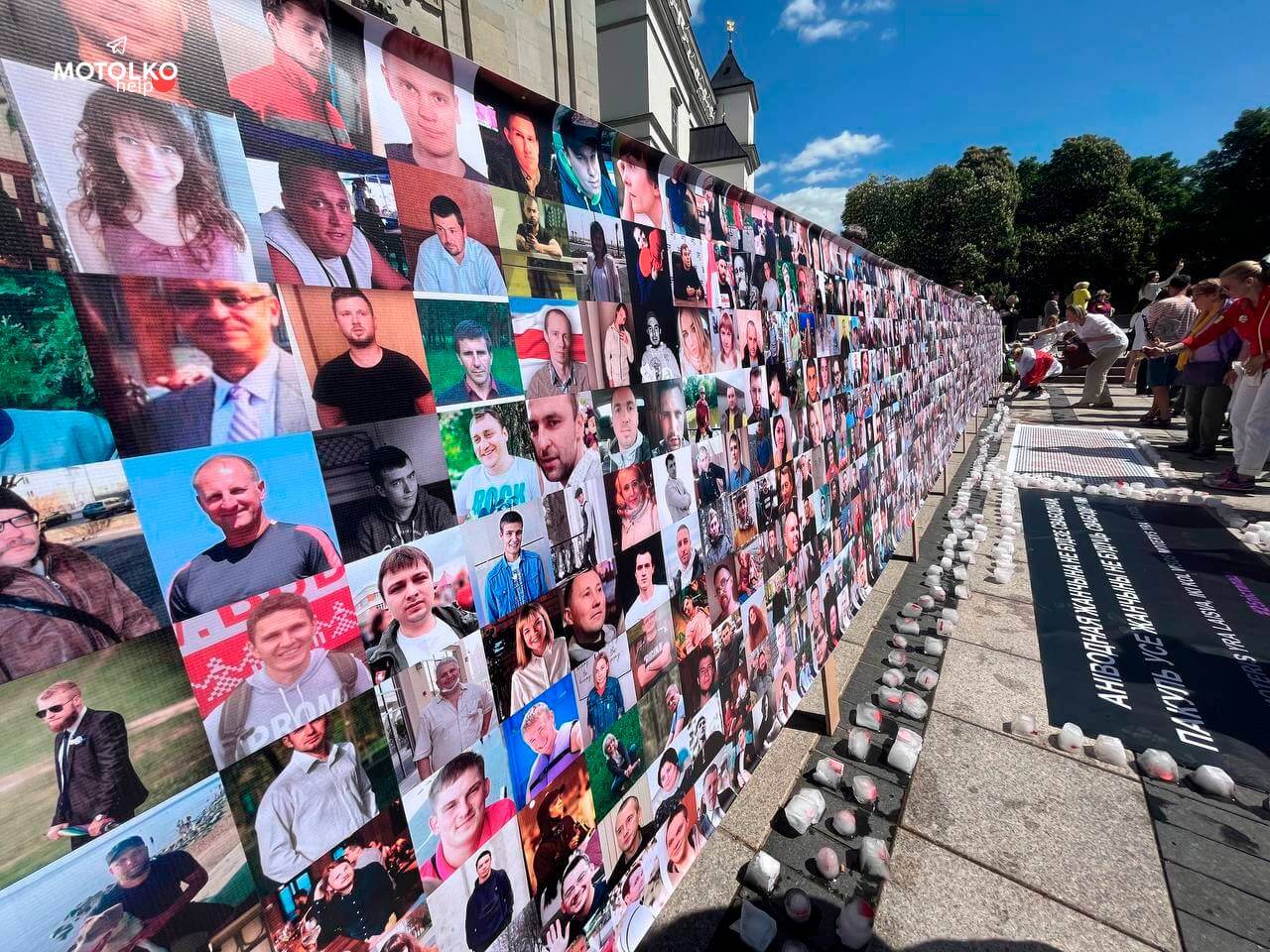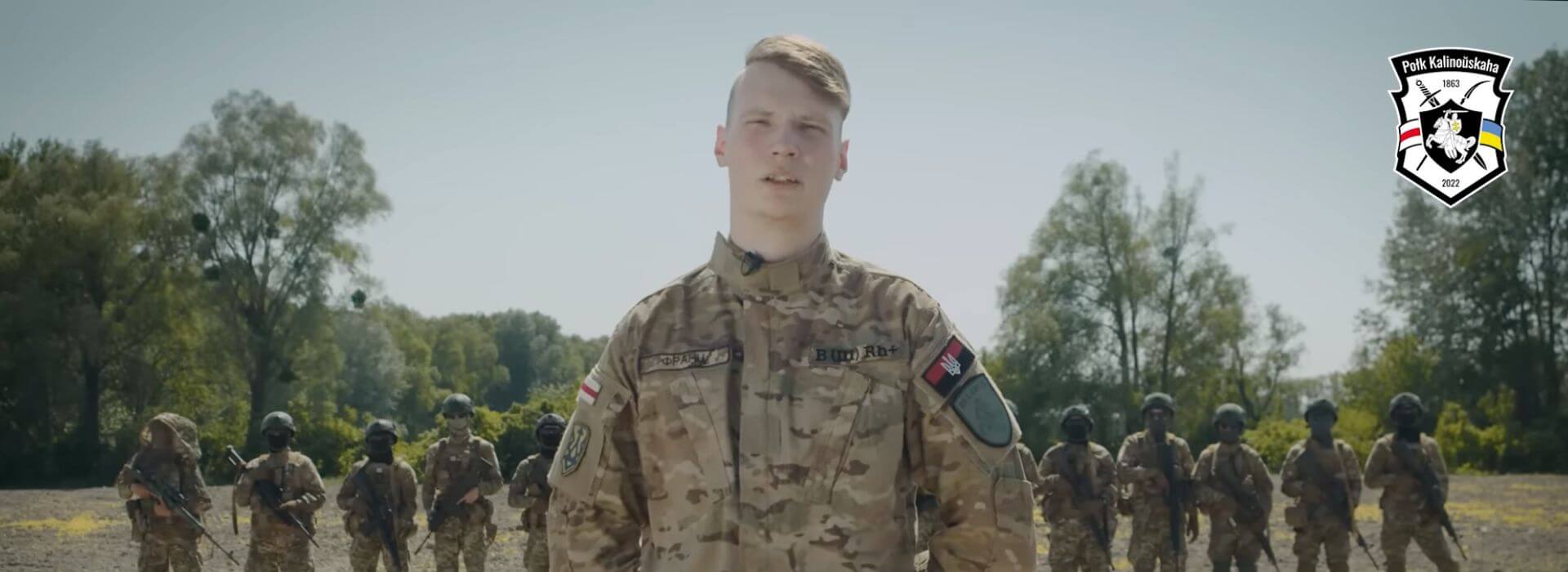- MILITARY DEVELOPMENTS
- POLITICAL DEVELOPMENTS
- HUMAN RIGHTS SITUATION AND INTERNATIONAL RESPONSE
- PROPAGANDA
MILITARY DEVELOPMENTS
Belarus Review (2023 edition, issue 3)
A weekly update on the ongoing political crisis in the Republic of Belarus prepared for you by the International Strategic Action Network for Security (iSANS).
On May 19, five Belarusian soldiers of the Kastuś Kalinoŭski Regiment were killed in action during the battle of Bakhmut. Four soldiers were killed under rubble of a multi-story building that collapsed during Russia’s heavy artillery shelling. The commander of Kalinoŭski’s evacuation unit that attempted to recover the wounded, was killed, too. This tragic incident is one of the largest single-time casualties sustained by the Belarusian troops in Ukraine. As of May 2023, nearly 45 Belarusian soldiers from the Ukraine Foreign Legion were killed in action. Belarusian volunteers are one of the largest foreign military groups fighting on the side of Ukraine’s army.
On the other side of the frontline, Russia resumed its railroad logistics in the territory of Belarus and regrouped its aviation located in this country. The Kremlin used recent deployment of its «regional group of troops» to cover the organization of combat training of the Russian military in Belarus.
Belarusian underground groups reported that between May 12 and May 18, at least three military trains with Russian cargo and troops departed from Belarus to Russia and Russia-occupied territories of Ukraine. Over the same period, three other freight trains with soldiers and military cargo arrived to Belarus from Russia (click here for detailed list of cargo and troops). Essentially, Russia’s trained units have been sent to the combat zone while new contingent is transported to training sites across Belarus.
Lukashenka’s air defense and army were reportedly «put on enhanced combat duty regime» following the downing of 2 Russia’s aircrafts and 2 helicopters in the Bryansk region on May 13. However, during 2023, Lukashenka’s propaganda has repeatedly reported on similar enhancement of combat duty status in Lukashenka’s Air Defense Forces. Local underground groups in Homiel region of Belarus reported that Lukashenka’s subordinates began the installation of the first line of «Dragon’s teeth» fortifications. Numerous anti-tank obstacles of reinforced concrete appeared around a road located close to the state border with Ukraine and Russia.
From May 17 to May 20, Minsk hosted an international arms fair MILEX-2023. It is noteworthy that all mentions of Iranian and Chinese weapons presented at the exhibition, were wiped off in propaganda reports about the event.
POLITICAL DEVELOPMENTS
On May 16-17, the head of the United Transitional Cabinet of Belarus Sviatlana Tsikhanovskaya attended the Summit of Heads of State and Government of the Council of Europe (CoE) in Reykjavík. The high-level summit took place for the first time since 2005.
The summit was highlighted by unique format that was applied for the first time in the history of the Council of Europe as a pan-European intergovernmental organization. Although Belarus is not a member of the Council, the CoE made an exceptional decision and invited Tsikhanouskaya as a special guest representing the United Transitional Cabinet of Belarus. This bold move by CoE leadership follows the organization’s commitment to increase cooperation with Belarusian democratic forces after the Council renounced all contacts with the Lukashenka regime in 2022. It also reflects growing understanding that the United States and its European Allies must prepare to replace Lukashenka.
Upon Tsikhanouskaya’s proposal, in September 2022, the CoE established a special liaison group with Belarus. Our expert assumption is that CoE Contact Group is expected to become one of the main tracks of Transatlantic and European integration of Belarus along with a comprehensive Strategic Dialogue between the United States and Belarus that was announced earlier this year. The final document of the summit, the Reykjavík Declaration, was signed by all delegations and mentioned increased cooperation between the Council of Europe and the Contact Group for cooperation with Belarusian society among other the long-term strategic goals of the Council of Europe.
The next meeting of CoE Contact Group for cooperation with Belarus is scheduled for June 2023. It is expected that Tsikhanouskaya will join the Parliamentary Assembly of the Council of Europe in mid-June for a presentation of a report on the situation with Belarusian refugees that is intended to change the pan-European attitude towards Belarusians in exile.
During the summit in Reykjavík, Tsikhanouskaya had work meetings with the Prime Minister of Portugal, President of Finland, Prime Minister of the Netherlands, Minister for Foreign Affairs of Iceland, and a wide range of high-rank CoE officials. The head of the United Transitional Cabinet of Belarus expressed a commitment to lead Belarus towards full-fledged membership at the Council of Europe, and noted that the establishment of a tribunal for Lukashenka is a priority for the democratic forces in light of confirmed facts of unlawful transfers and deportation of Ukrainian children by Russian forces to Belarus and Russia’s plan to deploy nukes in Belarus.
Last week, the Belarusian delegation joined the Baltic Assembly in Tallinn, Estonia. There, Tsikhanovskaya’s advisor on interparliamentary cooperation Anatol Lyabedzka reached an agreement that a group «For Democratic Belarus» will appear in the Estonian Parliament and the Parliament of Latvia. As of May 2023, such groups have already been established in 17 countries.

HUMAN RIGHTS SITUATION AND INTERNATIONAL RESPONSE
Over the last three years, at least 4,300 individuals faced criminal prosecution on political grounds. As of May 22, the list of political prisoners in Belarus has reached 1,525 persons and includes at least 9 (nine) minors. The youngest of them, Artyom Voitekhovich, turned 15 (fifteen) in detention.
Only some 250 former political prisoners have been released from detention – usually, after the end of their «term». However, new people are added to the list of Belarusian political prisoners on a daily basis following new brutal abductions of civilians. For instance, 21 individual has been added to the list of political prisoners on May 17 and 28 persons on May 18.
Among the newly recognized political prisoners, many have been convicted for participation in peaceful protests («group actions grossly violating public order»); others for publishing critical posts or comments in social media (“insulting the president of Belarus” and other state officials or “inciting hatred”), others for calling for the imposition of sanctions (“calling for actions aimed at causing harm to national security”), participation in pro-democracy groups (“joining an extremist organization”), posting names of alleged perpetrators of human rights violations in social media (“illegal actions with respect to information about private life and personal data”), while one individual was sentenced for “intelligence activities” and another for collecting and transmitting information about military equipment movements across Belarus (“high treason”).
Belarusian human rights defenders and democracy activists held a series of public events across the world on May 21, the Day of Solidarity with Political Prisoners in Belarus, to express solidarity with political prisoners in Belarus. Rallies, marches of solidarity, signing of postcards to political prisoners, public reading of their names, concerts, commemoration of political prisoners who have died behind bars, prayers, lighting of candles, a campaign in social media, and other activities have been held in Vilnius, Warsaw, Kyiv, Stockholm, Hamburg, Riga, Prague, Rome, London, Paris, Brussels, New York, Chicago, Detroit, Tbilisi, and other cities.
This year, human rights defenders decided to make the theme of the Day of Solidarity letters to political prisoners and their right to correspondence, which the Lukashenka regime illegally deprives of hundreds of incarcerated activists. Organizers called on supporters of democratic Belarus across the globe to express solidarity with all political prisoners, draw the attention of the Belarusian and international community to their problems, and demand the release of all political prisoners. A list of events is updated on the campaign’s webpage.
Vilnius-based analytical centre “Justice Hub” updated its database with the names of Belarusian judges involved in political repression. The list currently contains 216 names. It is not exhaustive as the work on the database continues. Experts have analyzed court verdicts and concluded that every third judge in Belarus has issued politically motivated verdicts. Many judges in Belarus participate in severe political repression and are therefore responsible for crimes against humanity, state representatives of the “Justice Hub”. While it is impossible to bring them to accountability under the current political regime, international pressure tools should be applied more actively to end impunity, including individual sanctions and investigation and trials in European countries under universal jurisdiction, commented Kristina Rikhter, Svitalana Tsikhanouskaya’s adviser on legal issues.
PROPAGANDA
Based on Russia’s experience, Lukashenka regime is aggressively consolidating pro-Russian historical myths through repressive use of legislation, threats, administrative instruments, propaganda, and new practices of punishments (such as arrests of «ideologically wrong» tour guides). We are particularly concerned about the practices led by Lukashenka – as a key implementation of Russia’s colonial administration in Belarus – to erase Belarusian culture, history, and other elements of identity and substitute them with foreign Russian narratives in mass media and education.
For instance, Lukashenka’s administration has developed «a unified state policy in the field of historical memory» that is essentially erasing Belarusian identity as such and replaces it with Russia’s narratives. A particular example of such policy is current campaign against Belarusian national hero Kastuś Kalinoŭski. The practices used to vilify Kalinoŭski in Belarus are identical to practices used against Ukraine’s national heroes of the past.
The head of Lukashenka’s administration, Ihar Serheenka – who was once seen as a pro-Belarusian bureaucrat – now repeats all core theses of notorious Russian propagandist Alexander Dyukov: “today, an external enemy plays on the personality of this so-called hero, using the example of his struggle for the idea of restoring Poland, trying to drive a wedge between fraternal peoples, to split society within one country.”
Following 2020 «August events» in Belarus, Dykov received full carte blanche to promote the Kremlin’s version of history at all levels in Belarus – including the national system of education that is entirely controlled by the de-facto government in Minsk. The theses voiced by Serheenka last week entirely repeat Dyukov’s pseudo-historical book “Unknown Kalinovsky. Propaganda of hatred and rebel terror in Belarusian lands, 1862-1864”. Using Russia’s funding, Dyukov been fiercely fighting Belarusian national heritage for a long time – with particular attention to Kalinoŭski.
Overall, Minsk-based propaganda workers now play an increasingly important role in the Kremlin’s global system of misinformation. After Russia’s propaganda outlets like Sputnik and RT faced bans and limitations on their content in the West, Belarusian propagandists have been weaponized by the Kremlin to target Russian-speaking communities across the world. This role is becoming increasingly important as Russia expects Ukraine’s counteroffensive – and will, undoubtedly, increase its investment in misinformation wherever possible.
After the OSCE confirmed unlawful transfers and deportation of Ukrainian children by Russian forces to Belarus, the Lukashenka regime began a massive campaign to whitewash its involvement in war crimes. However, in certain cases such attempts led to greater exposure of violations of the laws of war. For instance, last week, a press-secretary of Lukashenka’s «Ministry of Foreign Affairs» acknowledged that the de-facto authorities in Minsk have been involved in transportation of children from Russia-occupied territories of Ukraine into Belarus since 2016.
Lukashenka, in turn, made a false statement that Russia «has always sought peace» and Belarus «has always offered negotiations» since the beginning of their joint invasion to Ukraine in 2022. In reality, Lukashenka continues to provide direct military assistance to Russia’s military and provided Belarusian territory and airspace for land invasion, repetitive rocket attacks, and bombardments of Ukraine.
In the last 12 months, the foundation of pro-Lukashenka activist Aliaksei Talai (see picture above, bottom left) has championed the transfers of children from Russia-occupied territories of Ukraine into Belarus. Last week, Talai appeared on propaganda program hosted by internationally sanctioned Belarusian propagandist Ryhor Azaryonak (a.k.a. Grigory Azaryonok, pictured above, top left) supporting Lukashenka’s false narratives about the «peacefulness» of the regime in Minsk. Paradoxically, another guest in the program was a neo-nazi activist Sergey Lushch (see picture above, right) who is one of the most notable figures of Russian influence in Belarus.
Although there is certain rise in the morale of some Russia’s propagandists in the aftermath of last week’s news about the occupation of Bakhmut, the semantic lines of propaganda in Russia and Belarus have been notably changing from victorious to defeatist for already a few months now. Eschatological motives are, too, becoming more and more apparent in Russia’s TV mainstream. Although Russians initially present the news about possible occupation of Bakhmut as a «strategic win», many opinion leaders – including radical «voenkors» – question whether the ruins of a provincial city of Bakhnut were worth an almost year-long battle. With pre-war population rate comparable to today’s Camden, NJ, it is, indeed, a questionnaire «strategic» acquisition.
Best regards,
iSANS team










